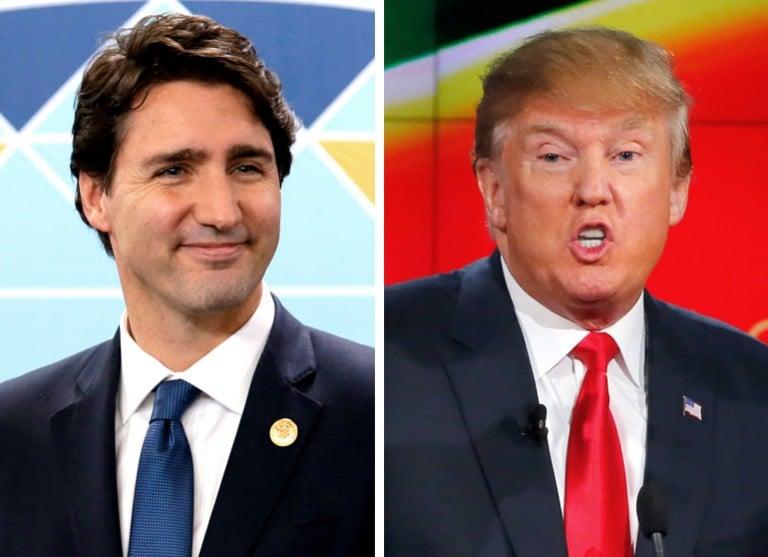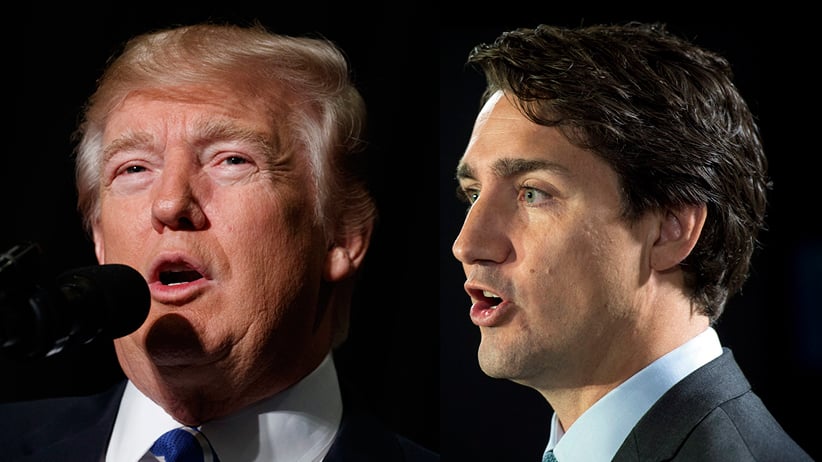The big issues that could be on the Trump – Trudeau agenda
From NAFTA and NATO to softwood lumber and climate change, here are the pressing issues in Canada-U.S. relations

Justin Trudeau and Donald Trump. (Reuters)
Share
There’s plenty at stake when Trudeau heads for Washington on Monday for his first face-to-face meeting with President Trump. What will they chat about behind closed doors? Here are five issues of paramount importance to Canada that could come up.
NAFTA
Trump’s hatred for NAFTA, the nearly 25-year-old trade agreement between Canada, the U.S. and Mexico, is no secret; he’s called it “the single worst trade deal ever approved in this country.” Trump has pinned the blame for the demise of U.S. manufacturing jobs on both China and Mexico, but it’s with the latter that he can be seen by his supporters to be taking immediate action.
“The president’s authority over trade agreements is short, sharp and limited,” says Laura Dawson, head of the Washington-based Wilson Center’s Canada Institute. “He can rip it up or he can suspend benefits for 120 days, but there aren’t many areas of renegotiation that he has sole authority over.”
Canada benefits greatly from NAFTA, not only via the roughly $40 billion of bilateral merchandise trade between Canada and Mexico, but especially through Canada’s trade relationship with America, which exceeds $880 billion in the flow of goods and services.
Best case scenario: The three countries have a close look at NAFTA for a long period of time and make updates that are mutually beneficial to all parties, says Dawson.
Worst case scenario: Trump simply rips up NAFTA. However, Canada still has a safety net in the Canada-U.S. free trade agreement that’s been sitting untouched since 1988. “It reflects a pre-Internet, pre digital, pre services economy,” Dawson says. “It’s a pretty basic trade agreement.” But it wouldn’t be awful for Canada.
What’s most likely is that Trump goes for a high-profile victory, like changes to the auto industry’s rules of origin, which could see a higher percentage of every North American-made vehicle get built in the U.S. America will come out as winners—until U.S. consumers see the steeper price tags.
Softwood lumber
It’s hard to imagine Trump unleashing a late-night tweetstorm about softwood lumber. What’s he going to write? “Canada’s wood deal with us is rotten. Make America chop again. Timber!!”
Still, there is big money at play, and America could hit Canadians with a 32 per cent export duty, as the U.S. Department of Commerce did in 1996. That measure cost Canadian companies billions.
“U.S. lumber groups have pursued this with the idea that if we restrict Canadian imports into the U.S., that’ll help boost the price of lumber,” says Harry Nelson, an assistant professor in the department of forest resources management at the University of British Columbia. “The last time when we had a strict quota system in the late 1990s, all of sudden people started shipping lumber from Scandinavia into the U.S. because the price warranted it.”
It’s been well over a year since the last softwood lumber agreement expired—and while former president Barack Obama told Canadians they had nothing to worry about when the issue was brought up during Trudeau’s previous visit to Washington, Obama isn’t in the White House anymore.
Best case scenario: “It’s completely unrealistic, because Donald Trump is so unpredictable, but it would be Trump not caring about softwood lumber,” Nelson says. “That would allow the Canadians to be more aggressive in some kind of trade deal and get something more favourable for us, like a graduated tax system or a quota system that isn’t so constraining.”
The worst case scenario? That would be Trump playing hard ball over something that is relatively insignificant in the larger picture for the U.S., but high on Canada’s list, he says. “There is no cost to the American side in terms of duties,” Nelson adds. “We’d be subject to the vagueness of congressional action, Trump’s mood and a long protracted legal battle.”

NATO
It’s tough to gauge how Donald Trump really feels about NATO, the nearly 70-year-old military alliance between Europe and North America. Depending on the day, or the hour, he’s referred to the alliance as “obsolete,” “very important to me”, and, most recently, something “we strongly support.”
There’s no denying the importance of NATO to Canada. “The government of Canada is one of four countries leading the deterrence measures currently underway in Europe, alongside the U.S., Germany and the U.K,” says Roland Paris, the research chair in International Security and Governance at the University of Ottawa, and a former senior advisor to Trudeau. “NATO is an alliance that is very important in Canadian foreign policy and has been for decades.”
Paris isn’t sure if NATO will be brought up during the first meeting of the two leaders, but says it’s possible that Trump starts up a conversation on defence spending. Under our commitment to NATO, Canada should spend two per cent of its GDP on defence, but right now we’re only about halfway there. After meeting with his U.S. counterpart earlier this month, Canada’s Defence Minister Harjit Sajjan said the country is “committed to investing in our defence.” How much investment could depend on the persuasiveness of Trump and his team.
Best case scenario: Trump dials back the rhetoric.
Worst case scenario: One of the foundations of post-war diplomacy and security in the West could crumble.
Climate change
It’s hardly a good omen that Trump picked a climate change denier to head America’s Environmental Protection Agency. Coal country came out in huge numbers to support Trump and he seems intent on fulfilling his promise to revive the industry. It’s bad news for the environment, and for Canada, which under the Trudeau government is pursuing a national carbon pricing plan.
“Canadian carbon prices are so much higher than any jurisdiction in the United States, and it puts Canada at an extraordinary disadvantage,” says Dawson, head of the Wilson Center’s Canada Institute. “When the carbon cost in Alberta is the highest in North America, why would you invest or produce there?”
Such public policy decisions made sense when America was also trying to reduce its carbon emissions, Dawson adds. Now they may need to be revisited. After all, this new U.S. administration doesn’t appear to be the kind to watch An Inconvenient Truth.
Best case scenario: “The Trump government surprises us,” she says. “They may say ‘we recognize a lot of people in the U.S. who support a carbon reduction plan and we think a carbon tax would be the least disruptive.’”
Worst case scenario: Canadian industries could find it incredibly difficult to compete, hurting Canadian jobs.
Refugees
In 2015, Trudeau wiped tears from his eyes as he met a plane full of Syrians arriving in Canada. Less than two years later, Trump banned any Syrian refugees from entering his country.
The issues of refugees will loom over Trudeau and Trump’s first meeting, whether they actually discuss it or not. The world has already seen how quickly a long-standing international relationship can grow strained over the issue, after Trump cut short a phone call with Australian Prime Minister Malcolm Turnbull when the topic of a refugee agreement between the two countries came up.
Meanwhile, Trudeau is under pressure of his own to accept refugee claimants turned away by America, now that Trump is in charge. But it’s not always that simple.
Canada and the U.S. are party to a “Safe Third Country Agreement,” which states refugees seeking protection must claim status in the first country in which that they arrive (with some exceptions). “The basic premise that underpins the agreement is we recognize each other as safe countries for refugees,’” says UBC law professor Efrat Arbel. “But the agreement only works if the United States is a safe country for refugees.”
And, as witnessed by Trump’s attempted travel ban on seven predominantly Muslim countries, not to mention scores of asylum seekers sneaking through the cold night to illegally cross from North Dakota into Manitoba, refugee claimants may not feel so welcome, or safe, in the Land of the Free.